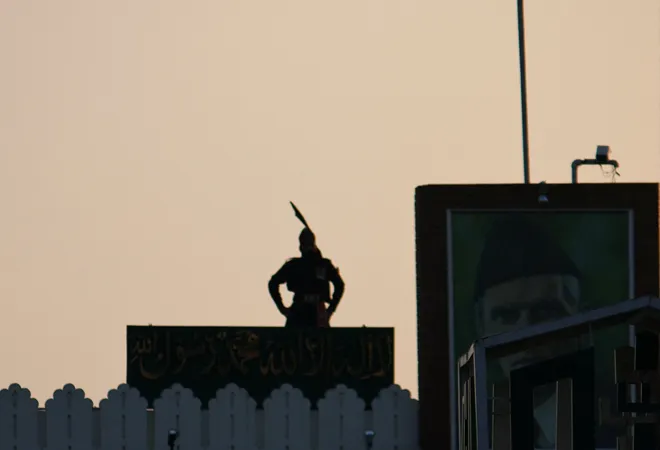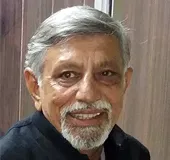
Last week when the Financial Action Task Force (FATF) was meeting in Paris to place Pakistan on the ‘Grey or Black List’ and the interim finance minister Dr. Shamshad Akhtar was presenting his case seeking every means to avoid it, actions within the country were conveying a different message. Whether the actions were deliberate or accidental means little, since they did convey the message. It may have been ignored by the FATF for now, but would be noted for the future, when Pakistan comes before it again.
Hours before the FATF was to meet, Pakistan lifted ban on a Sunni extremist outfit, Ahle Sunnat Wal Jamaat and unlocked assets of its chief, Maulana Ahmed Ludhianvi. The order was issued by the Pakistan National Counter Terrorism Authority. This removal came as a surprise, as international pressure mounts on Pakistan to act against terror groups. Some members of his group would now be contesting the forthcoming elections for both provincial and national assembly.
Hours before the FATF was to meet, Pakistan lifted ban on a Sunni extremist outfit, Ahle Sunnat Wal Jamaat and unlocked assets of its chief, Maulana Ahmed Ludhianvi. The order was issued by the Pakistan National Counter Terrorism Authority.
Days before the FATF meeting, Hafiz Saeed, the mastermind behind the Mumbai attacks and an internationally designated global terrorist, launched his party’s campaign for the coming elections. Since his own party, Milli Muslim League (MML) was banned from contesting elections, Hafiz launched the same from the platform of a defunct 15-year-old party, which remains registered with the election commission, Allah-o-Akbar Tehreek. It would field over 200 candidates, including the son and son-in-law of Hafiz Saeed for both the provincial and national assembly elections.
On the other hand, genuine politicians belonging to Nawaz Sharif’s PML(N) are being disqualified for multiple and miniscule reasons. Nawaz has been banned for life and presently battling multiple cases before the National Accountability Bureau, while Abbasi, who replaced him, has been disallowed to contest again on flimsy grounds. Abbasi’s appeal has been upheld by the high court, which would be hearing the case shortly. Its final decision is pending.
In addition, there are many other stalwarts of the party banned for multiple reasons. The claims being made by politicians of the PML(N) in rallies is that the army is behind this move as it visualises the party to be a threat to its power. The most vocal critic of the army and the judiciary, which has joined hands with the army, has been Nawaz Sharif himself. His criticism created such panic within the system that the Pakistan Chief Justice barred the press from publishing reports on Sharif’s comments.
The interim government has little to no control. Despite multiple appeals and reports,
The Dawn newspaper, which printed anti-army reports, including an interview with Nawaz Sharif, remains banned across various regions of the country. Journalists and bloggers have either been killed, kidnapped or their laptops stolen, pressurising them from speaking against the deep state, which has apart from its normal terror groups now included the top judiciary.
The most vocal critic of the army and the judiciary, which has joined hands with the army, has been Nawaz Sharif himself. His criticism created such panic within the system that the Pakistan Chief Justice barred the press from publishing reports on Sharif’s comments.
Based on the directions of the election commission, the army would now be deployed within and around all polling stations. No polling official in his right mind would dare to challenge any action being taken by army soldiers deployed within the polling booth. This implies that the army now has the power to determine the next government at the centre and in crucial states.
The Pakistan DGISPR (Director General Inter Services Public Relations) has been regularly harping on the views of their army chief, aptly termed the Bajwa doctrine. Based on the manner Pakistan is moving forward with its elections, the Bajwa doctrine should include a special column on national governance. This column should cover the unwritten message being sent to all politicians and political parties for eternity. If you even try and question or interfere with the aims, desires and power of the army, you would be facing multiple cases, genuine or fabricated remains a mute question.
While there may be international observers for the general elections scheduled for 25 this month (July), but very clearly the message has already been conveyed to all contesting. You tamper with the deep state, you would never get a level playing field. This has been made openly evident. It is evident in the case of the PML (N). On the other hand, all cases against Zardari were dropped in the end of 2017, opening doors for him to become a possible next PM. Imran Khan, who also faced an enquiry on similar grounds as Nawaz Sharif, has also been cleared.
Hence, the two leading contenders, Imran Khan and Zardari have suddenly begun toeing the army line, despite the army having been behind the assassination of Benazir. They are both aware of how the army toppled the PML (N) government in Baluchistan and would not desire the same. Imran Khan was allegedly used by the army as a stooge to stage lockdowns of Islamabad to increase pressure on Nawaz Sharif.
You tamper with the deep state, you would never get a level playing field. This has been made openly evident.
The support being provided to terrorist groups masquerading as political parties and religious political parties to enable them to participate in the elections is a threat to mainstream political parties. Simultaneously, the Awami Nationalist Party, which could pose a threat from the Khyber Pakhtunkhwa would be impacted. The support by the deep state to religious and terrorist groups contesting elections would determine the formation of governments at the provinces and centre.
Despite all its controls, the army still does not trust main stream politicians. Once in power, they could change colours and suddenly become a threat, requiring the army to once again adopt ingenious methods to dislodge them. Therefore, it has increased direct support to religious and terrorist groups now participating in elections.
It would aim to ensure that no single political party comes to power on its own majority and must seek the backing of those parties, religious or state sponsored terrorist groups, who owe their survival to the deep state and are propped up by them. This will ensure that even if a political leader even dreams of meandering off course, he could be easily discarded. It gave a small example of that in Baluchistan this year, when it broke the PML(N) majority government, days before elections to the Pakistan upper house.
Post 2018, the deep state’s control over the country could be complete. The government would remain under the army chief’s thumb and no PM would ever be able to challenge their writ.
The views expressed above belong to the author(s). ORF research and analyses now available on Telegram! Click here to access our curated content — blogs, longforms and interviews.



 Last week when the Financial Action Task Force (FATF) was meeting in Paris to place Pakistan on the ‘Grey or Black List’ and the interim finance minister Dr. Shamshad Akhtar was presenting his case seeking every means to avoid it, actions within the country were conveying a different message. Whether the actions were deliberate or accidental means little, since they did convey the message. It may have been ignored by the FATF for now, but would be noted for the future, when Pakistan comes before it again.
Hours before the FATF was to meet, Pakistan lifted ban on a Sunni extremist outfit, Ahle Sunnat Wal Jamaat and unlocked assets of its chief, Maulana Ahmed Ludhianvi. The order was issued by the Pakistan National Counter Terrorism Authority. This removal came as a surprise, as international pressure mounts on Pakistan to act against terror groups. Some members of his group would now be contesting the forthcoming elections for both provincial and national assembly.
Last week when the Financial Action Task Force (FATF) was meeting in Paris to place Pakistan on the ‘Grey or Black List’ and the interim finance minister Dr. Shamshad Akhtar was presenting his case seeking every means to avoid it, actions within the country were conveying a different message. Whether the actions were deliberate or accidental means little, since they did convey the message. It may have been ignored by the FATF for now, but would be noted for the future, when Pakistan comes before it again.
Hours before the FATF was to meet, Pakistan lifted ban on a Sunni extremist outfit, Ahle Sunnat Wal Jamaat and unlocked assets of its chief, Maulana Ahmed Ludhianvi. The order was issued by the Pakistan National Counter Terrorism Authority. This removal came as a surprise, as international pressure mounts on Pakistan to act against terror groups. Some members of his group would now be contesting the forthcoming elections for both provincial and national assembly.
 PREV
PREV


